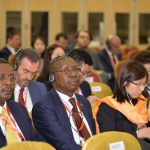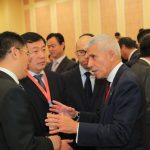 Enterprises believe Macao has played an important role as a platform between China and Portuguese-speaking Countries.
Enterprises believe Macao has played an important role as a platform between China and Portuguese-speaking Countries.
The “Summit on Mainland China’s State Owned Enterprises (SOEs) Support for Macao in the Building of Mainland China and Portuguese-speaking Countries’ Co-operation Platform” attracted the participation of many central SOEs, including central financial enterprises, as well as invited private enterprises from Mainland China, plus local enterprises, chambers of commerce, representative associations and enterprises of Portuguese-speaking Countries. Several participating companies from Mainland China and Portuguese-speaking Countries said they saw the meeting as being of great significance, and highlighted Macao’s role as an important business co-operation and services platform between Mainland China and Portuguese-speaking Countries. Macao can provide assistance to solve the challenges posed by linguistic, legal and cultural barriers – as well as those posed by other issues – in the process of co-operation between SOEs and Portuguese-speaking Countries’ enterprises.
Zhang Zongyan, President of China Railway Group Ltd, expressed the hope of enhancing co-operation with Portuguese-speaking Countries via the Summit. In fact, the company has been co-operating with Angola since 2008, and had various investment projects in several Portuguese-speaking Countries; with an aggregate investment of more than RMB10 billion. He believed that Macao – as a platform between Mainland China and Portuguese-speaking Countries – was very important. Chinese enterprises could encounter linguistic, legal and cultural barriers in the process of "going global", but all these could be solved via Macao’s platform role.
Song Zhiping, President of China National Building Materials Group Corporation, said that – as a large building materials supplier across the nation – the group had acquired the Macau Cement Manufacturing Co. Ltd. a few years ago, providing a supply of such materials for Portuguese-speaking Countries as well as Macao. He believed that, while Macao had a strong Chinese culture, it also served as a bridge to Western countries. Enterprises should make full use of the Macao platform, to connect with the international economy and business. The group’s current participation aimed at expanding financial co-operation and developing global business via the platform and Macao's financial system.
Wang Jianping, President and Secretary of the Party Committee of China Energy Engineering Group Co. Ltd., said that – by participating in the Summit – he would like to use the Macao’s international platform in order better to understand Portuguese-speaking Countries, and further to collaborate with these countries, especially in terms of laying the foundation for further co-operation on infrastructure between the two sides and fostering a mutually beneficial reciprocation. Mr Wang noted that his company was a nationwide energy enterprise, especially in the construction of power facilities. Since Portuguese-speaking Countries had a great demand for electricity, he believed that the company could go global and share with these countries China’s developmental experience.
Meng Fengchao, Chairman of China Railway Construction Corporation Ltd., said that the company had entered the Macao market more than 30 years ago, namely in 1981. Macao's first road tunnel was constructed by the company. The Summit had not only created a good platform for SOEs to enter Portuguese-speaking Countries to implement projects, but had also served a bridging role. China Railway Construction has been working quite well towards “going global” in the last few years, having construction projects – with an aggregate value equal to US$6 billion – in Angola, Brazil, Cape Verde and Mozambique. The current Summit has played a key role for the company in its next step of "going global".
Yang Ya, Chief Accountant of China Three Gorges Project Development Co., Ltd., said the group had invested in a Portuguese power company five years ago and was now one of the shareholders of Companhia de Electricidade de Macau – CEM, S.A., the Macao electricity utility. He believed that – thanks to Macao being the bridge between China and Portuguese-speaking Countries – Chinese enterprises could expand their business in the European Union, South America and Africa, through co-operation with Portuguese-speaking Countries. Macao was an international city and had a mature legal system, Mr Yang noted. Macao would be able to join hands with Chinese enterprises in the effort to “going global” in terms of legal services and financing platform services.
João Gamito Faria, Advisor at Portugal’s Caixa Geral de Depósitos, S.A., said the group had been conducting business through Banco Nacional Ultramarino (BNU) in Macao. He thought that Macao was of high strategic importance for the group and he had great expectations regarding the outcome of the Summit. His institution also believed the Summit would help the financial and lending institutions of Portuguese-speaking Countries to expand their businesses. Caixa Geral de Depósitos, which has subsidiaries in all Portuguese-speaking Countries, could provide services to Macao enterprises, those of Portuguese-speaking countries and Chinese SOEs.
Pedro Turras, General Manager of the International Treasury and Markets Division of Millennium bcp bank, said the group had branches and representative offices in a number of Portuguese-speaking Countries. He believed that the volume of trade between enterprises of Mainland China and African countries was increasing and would continue to rise. He noted Millennium bcp had branches in Angola, Macao and Mozambique. Thanks to the network of branches, the institution had certain advantages, he noted. He also pointed out that the platform role of Macao was crucial, considering that in the process of advancing co-operation between Portuguese-speaking Countries and Chinese enterprises, understanding of the Portuguese language and local support systems were required. In this regard, Macao could be beneficial for all.
View gallery


